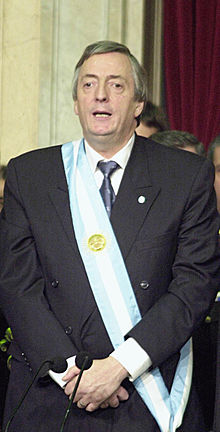

President of Argentina
Néstor Carlos Kirchner 25 February 1950 Río Gallegos, Santa Cruz, Argentina
27 October 2010(2010-10-27) (60) El Calafate, Santa Cruz, Argentina
25 May 2003 – 10 December 2007
President of Argentina For other uses, see Néstor Kirchner (disambiguation). Néstor Carlos Kirchner Jr. (Spanish pronunciation: ; 25 February 1950 – 27 October 2010) was an Argentine lawyer and politician who served as the President of Argentina from 2003 to 2007, Governor of Santa Cruz Province from 1991 to 2003, Secretary General of UNASUR and the first gentleman during the first tenure of his wife, Cristina Fernández de Kirchner. He was President of the Justicialist Party from 2008 to 2010. Ideologically, he identified himself as a Peronist and a progressive, with his political approach called Kirchnerism. Born in Río Gallegos, Santa Cruz, Kirchner studied law at the National University of La Plata. He met and married Cristina Fernández at this time, returned with her to Río Gallegos at graduation, and opened a law firm. Commentators have criticized him for a lack of legal activism during the Dirty War, an issue he would involve himself in as president. Kirchner ran for mayor of Río Gallegos in 1987 and for governor of Santa Cruz in 1991. He was reelected governor in 1995 and 1999 due to an amendment of the provincial constitution. Kirchner sided with Buenos Aires provincial governor Eduardo Duhalde against President Carlos Menem. Although Duhalde lost the 1999 presidential election, he was appointed president by the Congress when previous presidents Fernando de la Rúa and Adolfo Rodríguez Saá resigned during the December 2001 riots. Duhalde suggested that Kirchner run for president in 2003 in a bid to prevent Menem's return to the presidency. Menem won a plurality in the first round of the presidential election but, fearing that he would lose in the required runoff election, he resigned; Kirchner became president as a result. Kirchner took office on 25 May 2003. Roberto Lavagna, credited with the economic recovery during Duhalde's presidency, was retained as minister of economy and continued his economic policies. Argentina negotiated a swap of defaulted debt and repaid the International Monetary Fund. The National Institute of Statistics and Census intervened to underestimate growing inflation. Several Supreme Court judges resigned while fearing impeachment, and new justices were appointed. The amnesty for crimes committed during the Dirty War in enforcing the full-stop and due-obedience laws and the presidential pardons were repealed and declared unconstitutional. This led to new trials for the military who served during the 1970s. Argentina increased its integration with other Latin American countries, discontinuing its automatic alignment with the United States dating to the 1990s. The 2005 midterm elections were a victory for Kirchner, and signaled the end of Duhalde's supremacy in Buenos Aires Province. Instead of seeking reelection, Kirchner stepped aside in 2007 in support of his wife, who was elected president. He participated in Operation Emmanuel to release FARC hostages, and was narrowly defeated in the 2009 midterm election for deputy of Buenos Aires Province. Kirchner was appointed Secretary General of UNASUR in 2010. He and his wife were involved (either directly or through their close aides) in the 2013 political scandal known as the Route of the K-Money, even though no judicial investigation ever found any proof of wrongdoing by Néstor or Cristina Kirchner. Kirchner died of cardiac arrest on 27 October 2010, and received a state funeral.

We use cookies
We use cookies and other tracking technologies to improve your browsing experience on our website, to show you personalized content and targeted ads, to analyze our website traffic, and to understand where our visitors are coming from. Privacy Policy.